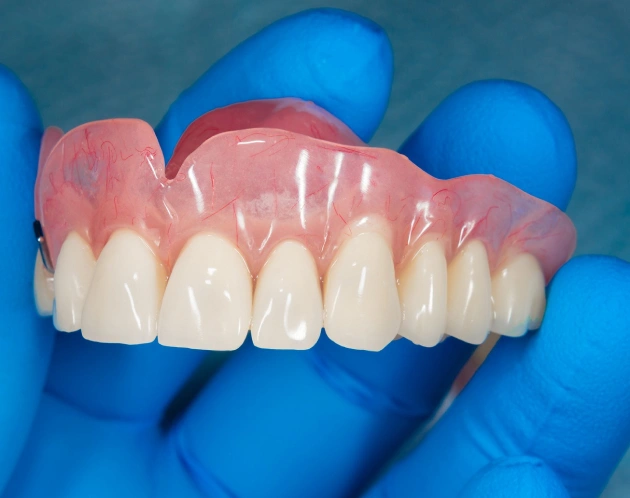Pay Online

Dentures: An Easy Solution for Missing Teeth
Dentures are removable oral appliances designed to fit comfortably on the gums, featuring artificial teeth that closely mimic natural ones, supported by a base. As a cost-effective option for replacing missing teeth, dentures can restore multiple or all teeth in either the upper or lower jaw. Unlike permanent alternatives like bridgework or dental implants, dentures offer the advantage of being removable for easy cleaning and maintenance of oral health. They can also be taken out during sleep for added convenience.
Types of Dentures
Removable dentures come in two main types: full dentures and partial dentures. The right choice for your smile depends on the number and condition of your natural teeth. If you still have healthy teeth, a partial denture may be ideal. However, if all of your upper or lower teeth are missing or need to be extracted, a full denture is the best option.
Full Dentures
Full dentures, or complete dentures, provide an effective solution for replacing all of the upper, lower, or both sets of teeth. It's important to understand that dental treatments are personalized. The design, creation, and fitting of full dentures are customized to suit each patient's specific needs.
Conventional Full Denture
After all remaining teeth are extracted and the surrounding tissues have healed, a custom full denture is crafted and placed. Constructing the denture after complete healing ensures a precise and comfortable fit.
Immediate Denture
An immediate denture is placed right after tooth extraction, allowing patients to have teeth immediately without waiting for full healing. While this offers the benefit of not being without teeth, adjustments and relining may be needed as the tissues heal. In some cases, a conventional denture may be recommended for the best comfort and fit.
Overdenture
An overdenture is a complete denture that is enhanced with attachments for added stability and support. These attachments are secured to either existing natural teeth or dental implants.
Implant-Supported Dentures
An implant-supported denture attaches to a series of strategically placed implants in the upper or lower jaw. These implants act as small surgical posts, offering secure attachment points that greatly enhance the denture's stability and retention.
Partial Dentures
Partial dentures offer a practical solution for replacing missing teeth, especially when some natural teeth remain intact. These dentures are secured using clasps or precision attachments that connect to adjacent teeth, providing stability and a secure fit in the edentulous areas (spaces left by missing teeth).
Designed to restore both the appearance and function of your smile, partial dentures prevent remaining natural teeth from shifting and stabilize the bite. Whether you're missing one tooth or several, partial dentures help maintain the alignment of your teeth.
Thanks to advancements in dental technology and materials, partial dentures can now be crafted from various materials such as cast metal, flexible resins, and hybrid options, offering both durability and comfort. At Ryan J. Poppin, DDS, we take pride in creating custom dentures that not only enhance your smile but also ensure a comfortable, long-lasting fit.
What to Expect When Receiving Your New Denture
At Ryan J. Poppin, DDS, your comfort and well-being are our top priorities. We are committed to promoting excellent oral health and keeping you well-informed at every step of your dental care journey.
Adjusting to Wearing a New Denture
Adjusting to a new denture, especially a full denture, may take a little time. It’s normal to encounter minor difficulties while speaking, chewing, and using your new teeth. A few adjustments may be needed to ensure a proper and comfortable fit. If you experience any sore spots, we suggest wearing the denture for at least a day before your adjustment appointment, so we can pinpoint the areas causing discomfort and make the necessary changes.
More Saliva Than Usual
Increased saliva production is a natural, temporary response to new dentures. There’s no need to worry, as this excess salivation will gradually return to normal as you adjust to your dentures.
Speaking With Ease
At first, speaking clearly with new dentures may be a bit challenging, but this sensation will lessen after a few days. To help with the adjustment, try maintaining regular speech and practice reading aloud from books or screens.
Getting Used to Eating With a Denture
If you're new to dentures, getting used to eating with them can take time. Eating with a full denture can be more challenging than with a partial one. To ease the transition, start with soft foods and try to chew on both sides. As your tongue, lips, cheeks, and soft tissues adjust, eating will become more comfortable.
Taking Care of Your Dentures
Here are some tips for maintaining clean and healthy dentures:
- After meals, rinse your dentures and brush them daily to prevent stains and bacteria buildup. Use a brush designed specifically for dentures for the best results. When not in use, soak your dentures in water, and at least once a week, clean them thoroughly with a recommended denture cleaner.
- Don't forget to brush your remaining teeth and gums regularly to maintain oral health and keep your tissues firm and healthy. For those with an upper denture, be sure to clean the roof of your mouth gently as well.
- Remove your dentures before bed to give your gums and jawbone a chance to rest. This helps prevent irritation, infection, and bone shrinkage (resorption).
Added Stability
In certain cases, the condition of the underlying tissues and other factors may require additional retention options for full dentures. While denture adhesive is usually adequate, implant-supported or attachment-clipped dentures provide enhanced stability and better retention.
Follow-up Care
Regular checkups are essential for maintaining oral health and overall well-being. During these visits, we not only assess the fit and condition of your dentures but also conduct a thorough examination of any remaining teeth and evaluate the health of the soft and hard tissues in your mouth.
Relines
Over time, the supporting tissues for your dentures may change, causing a decrease in comfort and stability as the shape and contours of the tissues shrink or remodel. In such cases, a reline procedure may be necessary to restore the fit and function of your dentures.
At Ryan J. Poppin, DDS, we are dedicated to providing exceptional care. If you have any questions or concerns about your dentures, don’t hesitate to reach out to our office. We’re here to help!
